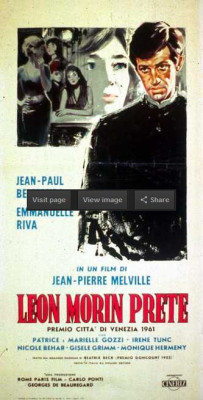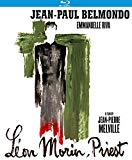| Reviews & Columns |
|
Reviews DVD TV on DVD Blu-ray 4K UHD International DVDs In Theaters Reviews by Studio Video Games Features Collector Series DVDs Easter Egg Database Interviews DVD Talk Radio Feature Articles Columns Anime Talk DVD Savant Horror DVDs The M.O.D. Squad Art House HD Talk Silent DVD
|
DVD Talk Forum |
|
|
| Resources |
|
DVD Price Search Customer Service #'s RCE Info Links |
|
Columns
|
|
|
Léon Morin, Priest
Léon Morin, Priest (Léon Morin, prêtre, 1961) is set during the Occupation but the Résistance is mostly off on the sidelines. Instead, this adaptation of a 1952 novel by Béatrix Beck, The Passionate Heart, is primarily concerned with religious faith. However, the wartime setting is vividly realized so that, despite its many talky scenes, it's quite engrossing nonetheless. Jean-Paul Belmondo (Breathless) and Emmanuelle Riva (Hiroshima mon amour), both near the beginning of their long careers, star.
Criterion had earlier released the film to Blu-ray, in 2011, but the rights reverted back to Canal-Plus. They turned around and licensed it again, this time to Kino. This new release looks great, and includes both original and Canal-Plus-made supplements.
In a town at the foot of the French Alps, apparently near the Italian border, Barny (Riva) works at a correspondence school, relocated from Paris. Italian soldiers with feather-adorned hats occupy the town initially, they acting more like carefree tourists than occupiers, but then the Germans march in to replace them, worrying those with Jewish blood or communist ties. Barny would seem particularly vulnerable, she being an atheist communist with a half-Jewish daughter, France (Patricia Gozzi). She and other mothers of half-Jewish kids, whose partisan husbands are either dead or who've gone into hiding in the country beyond, decide to baptize their children as a precaution.
Barny, while acknowledging the prudency of this move, also recognize its absurdity. On a whim this fallen Catholic decides to go to Confession for the first time in years, basically to pick a philosophical fight with a nearly randomly-chosen priest. (She selects "Léon Morin," sight-unseen, over the others, because his name suggests peasant-stock.)
Father Léon (Belmondo) is not at all what Barny expects. Rather than taking a defensive stance against Barny's strident rudeness, he instead agrees with many of her complaints about the Church: too much opulence and not enough caring for the poor, too accommodating of the class system, etc. Further startling Barny is the priest's offer to meet with her later, to loan her some religious teaching and philosophy books.
The meetings quickly become a regular occurrence. Barny plows through the first book given her in a single night; she'd expected never being able to get through it at all. Their content of their lively debates is, perhaps, less important than their core positions and character. He is a nonjudgmental humanist who believes it's up to each individual to find their own way to God. He's placid rather than fiery, Belmondo's performance based on Melville's always-calm demeanor, a far cry from his usual exuberant style. She's sturdy and never wears makeup, sensibly dressed, direct around friends but discreet when she needs to be.
Gradually she learns of other women coming to meet with Father Léon, all young and attractive like her. Naturally, there's a strong undercurrent of sexual tension. Will she fall in love and/or try to seduce him, or vice versa, or not at all? Early scenes show Barny pining away for her female supervisor, describing her to a friend in platitudes like an overwrought schoolgirl. This might suggest Barney is bisexual, but maybe not. As the priest notes later, all of the men her age have vanished; who else to turn to for sexual comfort? That they openly discuss sexual matters, including her masturbating with a piece of wood, is shocking even today in its casualness and its setting.
Of course, she comes to admire and fall in love with this priest, though he remains aloof about their unusual, ambiguous meeting arrangement. A "bad girl" who boasts of seducing both Germans and Frenchmen tries to ply her skills on the priest, but he coldly rebuffs her advances.
Melville's adaptation is episodic, little confined scenes like chapters in a book. She befriends a woman her age who's rumored to be an informant targeted for murder by the Résistance. She agonizes over whether to tell her so that she can leave town - but to where? In another she decides to move her daughter into the country, into the care of two elderly women, old maids or, maybe, an old lesbian couple. They welcome the sweet girl with open arms but as soon as the Germans leave they can't wait to get rid of her. In another scene Barny rides her bicycle over a railroad crossing, strictly verboten says the threatening German guard. She claims ignorance, and the audience worries this will cause her to be arrested, or worse.
The Germans, disappearing Jews and other perceived troublemakers, may act like ICE agents but, as the story is told from Barny's perspective, rarely does the audience see them in action. (Busy Swiss-born actor Howard Vernon, prominently billed, turns up as a Nazi colonel, but his entire appearance lasts less than a minute.) Ironically, the film's tensest moment involves an American soldier, a supposed liberator who threatens her and France when she refuses casual sex.
All of these scenes have an authentic air and seemed to be based upon the real-life wartime experiences of author Beck and director Melville.
Video & Audio
Presented in its original black-and-white and 1.66:1 widescreen from a 4K remastering of the original negative, Léon Morin, Priest looks nearly flawless, with only its open title card elements less than perfect. I never looked at Criterion's earlier release, but am told it's a vast improvement. The DTS-HD Master Audio 2.0 mono, in French only with optional English subtitles, is likewise very good. Region "A" encoded.
Extra Features
Supplements include an audio commentary with filmmaker Mike Siegel; "The Demon Within Him," the same Volker Schlondorff featurette appearing on other concurrent Kino-Melville titles; "Master Class with Philippe Labro and Remy Grumbach," the filmmakers effusive in their praise of Melville before a theater audience, interspersed with film clips and running more than an hour; 24 heures de la vie d'un clown (1946), a strange but imaginative short film that marked Melville's directorial debut. (The short utilizes a standard-def master and the transfer is rather mediocre.) A trailer rounds out the extras.
Parting Thoughts
An atypical Melville film but most worthwhile, Léon Morin, Priest is a DVD Talk Collectors Series title.
Stuart Galbraith IV is the Kyoto-based film historian currently restoring a 200-year-old Japanese farmhouse.
|
| Popular Reviews |
| Sponsored Links |
|
|
| Sponsored Links |
|
|
| Release List | Reviews | Shop | Newsletter | Forum | DVD Giveaways | Blu-Ray | Advertise |
|
Copyright 2024 DVDTalk.com All Rights Reserved. Legal Info, Privacy Policy, Terms of Use,
Manage Preferences,
Your Privacy Choices | |||||||













